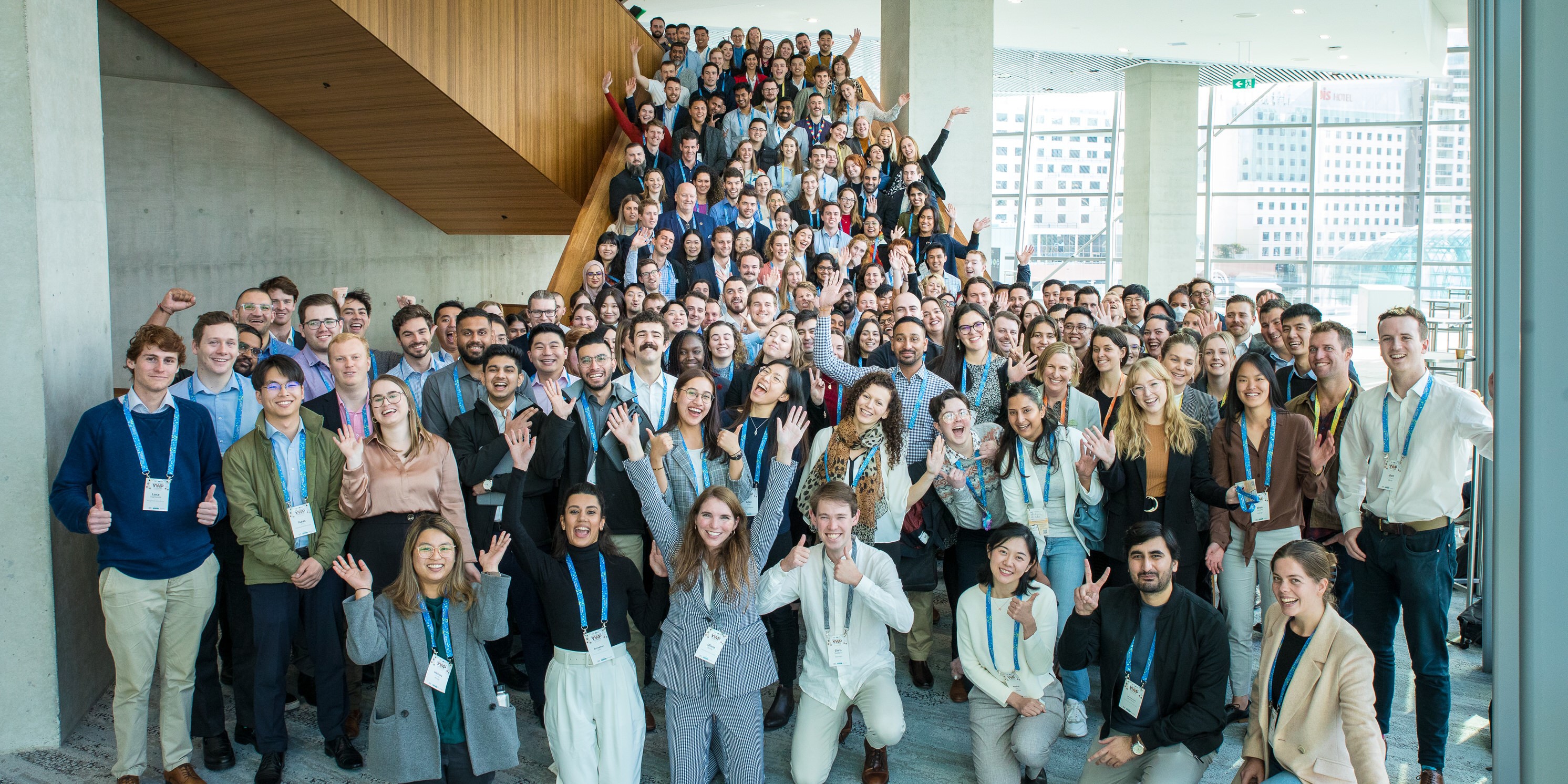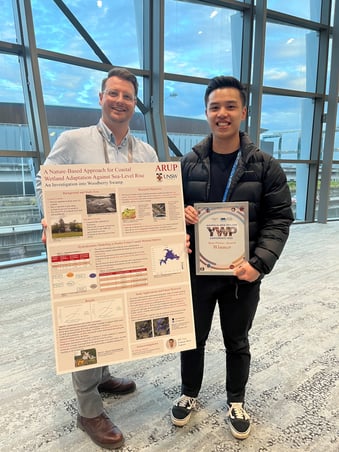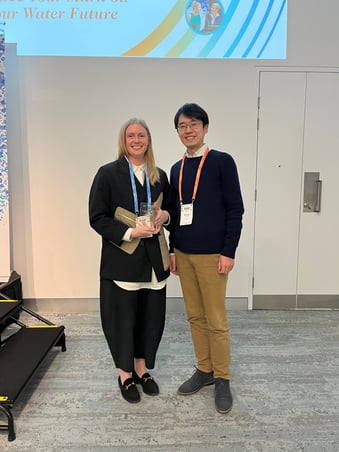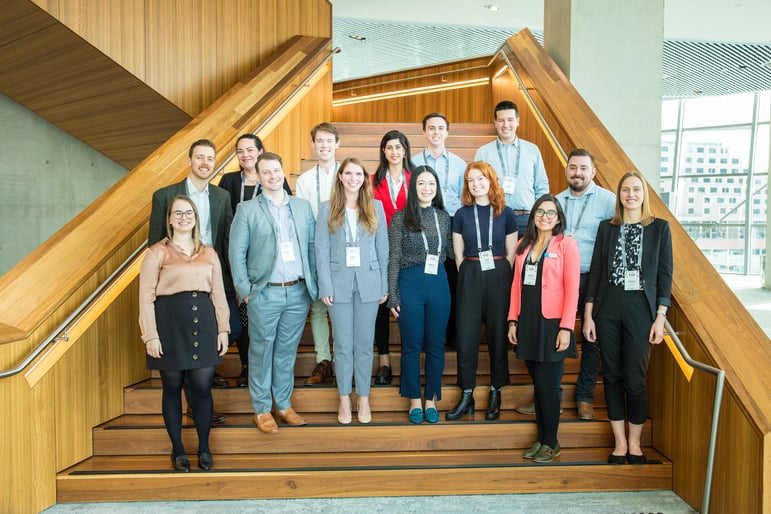Leaving your mark – Highlights from the 2022 IWA/AWA YWP Conference

The 2022 Australian Water Association and International Water Association Australia-New Zealand Young Water Professionals Conference saw over 200 future leaders of industry, research and government gather to discuss how to leave their mark on our water future.
In present circumstances, large gatherings are novel and few and far between, but the Young Water Professionals took the opportunity to attend and collaborate at the event held in Sydney on 29-30 June at the ICC. The theme for the conference was ‘Leave your Mark on our Water Future’.
The conference theme was readily embraced by the cohort and created a very inclusive and supportive platform for young professionals to share their passion, collaborate and challenge ideas. This was represented onsite through a story wall, proudly sponsored by GHD. The theme also attracted speakers and delegates to showcase their contributions to the water sector, plan for its future and inspire change among the industry leaders and their peers. The program featured three inspiring keynote speakers, 30 technical presentations, eight interactive workshops and panel sessions, as well as a Conference Dinner, two site tours and an amazing race around Darling Harbour.
Day One commenced with an inspiring keynote address by Simon Roberts. A panel of climate experts then tackled mitigation and adaptation questions that are relevant to all water professionals. Their expertise spans utility action, risk, social impact, disaster response, climate science, and more. Delegate questions came in quick and it was incredible to see everyone engaging on such a critical topic. Popular questions included “What initiatives have you seen to reduce footprints other than offsetting” and “How can we look to indigenous knowledge to improve water management in the face of a changing climate”. Key ideas that emerged from the panel included using a carbon metric to compare designs, collaboration across sectors to share ideas, and using our voting power to signal a need for action. Thanks to Arcadis for their support of this session.
The first technical session identified that there are some great approaches to community engagement and empowerment that can be incorporated into our work to have better outcomes for society, so let’s make this part of business as usual. Delegates heard about Wastewater Management in Fiji – while much of the technical work was undertaken by the Australian GHD team, they recognised the importance of involving the local team in Fiji and upskilling the local workers. Then a local case study in the Murray Darling showed that Blockchain can empower communities through improved records management, real-time monitoring, access to market announcements and greater stakeholder engagement; however, blockchain won’t fix everything and it will be important to discuss issues around governance and market integrity.
“So many people interact with the water, we need to ensure they all have a certain level of knowledge around how the system works,” said Danika Smith, Arup (on behalf of Bill Robinson).
The next speaker talked about incorporating social value into projects can include consideration of community wellbeing, equality and equity, housing, mobility, job security, physical and mental health and access to vital services. Another case study from SA Water challenged the delegates to understand their customers’ needs and answer the question “How can we ensure our customers can communicate with us, be seen by us and feel that they have a reliable source of water”? Lastly, SA Water’s Pride Together program showed how this has helped employees feel more comfortable in the workplace, through initiatives primarily driven by emerging professionals, including awareness and allyship training.
The future planning session imparted a general message of hope for the future, specifically around how we as YWPs can make a difference now to improve our future. Thoughts about integrated planning were at the forefront of this session and individual case studies supported this observation. The first presentation spoke about creating a community to set up ways to establish adaptive planning principles at work. Sam Skinner stated that “adaptive planning provides the capability to deliver, value for community and authorisation for governance”. The YWPs then looked at assessing options for the community for a wastewater treatment plant in Jabiru, NT. The following speaker looked at how to deliver water to remote communities through new technologies that ensure all communities get access to safe drinking water. Caitlin Fisher identified that “closing the gap has been a key goal of the Australian government… but drinking water is a key link that has been missed”. We then heard about how a YWP led the response to the 2022 flood emergency in Sydney. The discussion led on to future planning and how IWM can bring together solutions to result in insightful and practical outcomes.
After a fantastic first day of conferencing, attendees enjoyed a networking dinner held at The Loft, Barangaroo, proudly sponsored by Arup. Day Two then kicked off with two keynotes on cultural inclusion in water from Troy Brockbank and Andrea Gonzalez.
Digital Transformation explored the Internet of Things (IoT) and delegates heard about the challenges that have been seen through pilot studies in regional Sydney. Next, we heard about the evolution in residential water efficiency with smart technology being invested in the home from bathrooms to irrigation and how that will impact water efficiency in the future. However, as always with large amounts of data, how do we conceptualise cyber security risks for water networks and what is truly the likelihood of a physical attack? Lastly, the session finished with using alternative technology to de-risk capital improvements where the delegates learnt about compact machines that can do underwater mapping without human interaction.
Sustainability had a continuing theme of PFAS as an emerging contaminant but instead of looking at the past, the YWPs got to hear some great case studies into available methods for PFAS treatment to safeguard our future. There was a significant amount of interest in future research into the impact of other contaminants on the treatment methods. The follow-up presentation explained H2S workplace exposure standards as this will have far-reaching impacts on future designs at all wastewater treatment plants. It was interesting to hear that its expected industry will push back, as so far SafeWork is only giving three years for all plants to comply with the new guidelines. Then the delegates learnt about algae-bacteria aggregated flocs (ABAF), a very creative, novel idea where two historically tricky contaminants (algae and bacteria) were used against each other to create stable flocs and achieve significant removal of both. Lastly, a discussion on drought in New Zealand is an apt reminder that drought requires rapid action and sometimes that will lead to mishaps or changes during construction that need to be dealt with daily and how this can be achieved sustainably.
The Wara Paring panel session and workshop was an amazing way to end the formal conference. The panel session was attended by Soyun Punyadasa, Leon Egan, Eammon Kelly and Manish Pancholi in which they shared with the YWPs the Wara Paring story, a great example of a successful Indigenous-owned business. To hear how this came about, with the challenges and the real drive for change, was inspirational. The delegates were then able to question the panelists and deep dive into their wealth of knowledge. The tables were then turned and all 200 delegates were split into groups of eight to ten (supported by local leaders) to share what they had learnt from the Wara Paring case study. They explored what pathways, opportunities, and challenges in their role within the water industry could help to act and inspire to create change with a better understanding for how they can help create meaningful employment opportunities for First Nations people.
While judges had the unenviable task of trying to draw standout presentations and posters from so many excellent contributions over the two days, the honour of Best Paper, thanks to the support of UNSW, deservedly went to Toni Henderson, AECOM for her paper "PFAS is the name, destruction is the aim: findings from the pilot scale DE-FLURO™ Remediation System Demonstration". The paper explained the pilot results indicate a high potential for DE-FLUORO™ to be coupled with a polishing unit or existing water treatment system to reduce the majority of the PFAS mass and a polishing unit to reduce the remaining concentrations to levels suitable for discharge or disposal. Bill Tran, Arup won the best paper for his work in "A Nature-Based Approach for Coastal Wetland Adaptation Against Sea-Level Rise".


To finish off the jam-packed conference, the delegates formed teams and raced around the iconic Sydney Darling Harbour. Congratulations to Team J (consisting of Ali Farhat, Cilna van Wijk, Timothy Lewis and Jessica Hamilton from Jacobs)!
After two days of impactful presentations and panel sessions, there were fun-filled and informative site tours to Taronga Zoo and Manly Hydraulics Laboratory and 4 Pines Brewery.
This conference would not have been possible without the support of sponsors from New South Wales and around the country; Jacobs, Beca HunterH2O, Eurofins, Water Infrastructure NSW, Arup, GHD, Aurecon, Arcadis, UNSW Global Water Institute and Manly Hydraulics Laboratory.
Special thanks must also go to the conference organising committee, led by Matt Schnelle and Olivia Bittle. This event would also not have been possible without the amazing Elyse Gradwell from the AWA. The success of this conference was the result of almost a year of hard work in planning, organising and delivering on the day.

Focusing on the future and bringing together tomorrow's leaders is so important to inspire, connect and share how YWPs have a vital role to play as they grow their careers in water. There is little doubt that this event will continue to be a popular one in the Australia-New Zealand water calendar. You can view the event photo gallery for more.
Johanna Johnson was on the conference organising committee.

